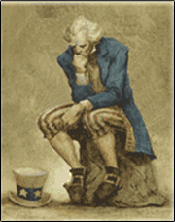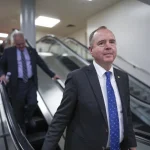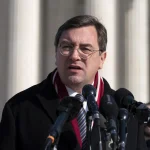
–>
July 11, 2023
Can one state implement a law enacted by another?
‘); googletag.cmd.push(function () { googletag.display(‘div-gpt-ad-1609268089992-0’); }); document.write(”); googletag.cmd.push(function() { googletag.pubads().addEventListener(‘slotRenderEnded’, function(event) { if (event.slot.getSlotElementId() == “div-hre-Americanthinker—New-3028”) { googletag.display(“div-hre-Americanthinker—New-3028”); } }); }); }
Can it enforce regulations set by bureaucrats in another?
If it does, isn’t the state ignoring the will of its people? And isn’t that unconstitutional? The commonsense answers are evident. But the practice of outsourcing is widespread in emissions regulation.
Besides Washington D.C., as many as 14 states – the CARB states, so called after the California Air Resources Board – apply the bluebook, California’s stringent air pollution control laws. In most of them, lawmakers have neither legislated on the matter nor consulted citizens.
‘); googletag.cmd.push(function () { googletag.display(‘div-gpt-ad-1609270365559-0’); }); document.write(”); googletag.cmd.push(function() { googletag.pubads().addEventListener(‘slotRenderEnded’, function(event) { if (event.slot.getSlotElementId() == “div-hre-Americanthinker—New-3035”) { googletag.display(“div-hre-Americanthinker—New-3035”); } }); }); }
This anomaly is being challenged as unconstitutional by Peters Brothers Inc., a trucking firm based in Lenhartsville, Pennsylvania. The family business owns a fleet of refrigerated trucks. Recent changes in California emission standards have imposed unexpected heavy expenses that were never deliberated by Pennsylvania’s legislators and citizens. The Pennsylvania Motor Truck Association (PMTA), another trucking company, and two truck dealers are also petitioners in the case. The case has been taken up by the pro bono Pacific Legal Foundation (PLF), which takes a special interest in separation-of-powers cases.
In Peters Brothers Inc, et al. v. Pennsylvania Dept of Environmental Protection, et al, filed last month in the Commonwealth Court, Harrisburg, the PLF argues that only the Pennsylvania General Assembly can make laws for the state: the legislature speaks for, and is accountable to, the people it represents. The lawsuit’s direct challenge is to 25 Pa. Code § 126.501, which incorporates in Pennsylvania standards set by bureaucrats in California.
But it digs deeper. The Pennsylvania Environmental Quality Board, which adopted regulations from California, claims it has rule-making authority under the Pennsylvania Air Pollution Control Act (PAPCA). The lawsuit asserts that this is invalid. It argues that if indeed the General Assembly, in framing PAPCA, gave the board, a state agency, the power to adopt California regulations, the Assembly has violated the non-delegation doctrine: a legislature cannot, after all, give away its law-making power.
Besides, PAPCA requires that the General Assembly consult with Pennsylvania’s Secretary of Transportation before instituting new regulations or changing existing ones. This procedure was not followed in adopting the California code. And California, in framing its code, or while changing it from time to time, quite obviously did not consult Pennsylvania’s Secretary of Transportation. California did not invite opinion from the people of Pennsylvania either, as it did from its own residents. The lawsuit argues that accountability to Pennsylvanians was thus summarily abdicated.
How did this come to pass? As a bellwether, California has set many national trends, especially with progressive ideas like laws on sexual harassment, paid family leave, and disability discrimination. Other states have followed suit. California, therefore, has disproportionate influence across the country on many matters. But when states, driven by political motives, impose regulations borrowed from California, the rights of their residents are compromised.
California’s emission standards are among the most stringent in the country. Besides D.C., the states that have adopted its standards are Delaware, Maine, Maryland, Massachusetts, New Jersey, New Mexico, New York, Nevada, Oregon, Pennsylvania, Rhode Island, Virginia, Vermont, and Washington.
‘); googletag.cmd.push(function () { googletag.display(‘div-gpt-ad-1609268078422-0’); }); document.write(”); googletag.cmd.push(function() { googletag.pubads().addEventListener(‘slotRenderEnded’, function(event) { if (event.slot.getSlotElementId() == “div-hre-Americanthinker—New-3027”) { googletag.display(“div-hre-Americanthinker—New-3027”); } }); }); } if (publir_show_ads) { document.write(“
It was in 2002 that the Pennsylvania Environment Quality Board adopted California’s emission standards for diesel-fueled trucks in perpetuity. Whatever changes California made, however increasingly severe, to suit an extreme environmentalist agenda, Pennsylvanians would have to obey without question. Indeed, many changes went unchallenged: limits were set on heavy-duty engines in 2005, and on idling in 2008.
On January 1 this year, CARB published its latest regulations requiring diesel-fueled trucks seeking registration to have engines produced in 2010 or later. Then, in April, California’s regulators proposed new requirements for medium and heavy-duty vehicles sold in the state to be zero-emissions by 2036.
The relentless tightening is aimed at ending the use of diesel-fueled trucks, replacing them with electric vehicles (EVs). This is counterproductive from an environment perspective: building EV parts requires massive amounts of fossil fuels. Moreover, electricity for recharging is generated by burning natural gas. Non-recyclable EV batteries will eventually pollute the soil. But the irony is lost on eco-warriors.
Upgrading to abide by the new emission and extended-warranty standards will prove costly for small operators. For instance, Peters Brothers, with a fleet of about 200 trucks, replaces 13 vehicles every year. Therefore, says the PLF, it “must pay a huge chunk of extra money” for warranties it “neither wants nor needs.” Higher purchase costs will handicap small operators against truckers from non-CARB states, who can sell a broader range of products cheaper. Truck dealers in Pennsylvania, like Transteck (a petitioner), are already seeing customers flee to non-CARB states. Competitors in non-CARB states are actively wooing Pennsylvania truckers.
“This is a situation these firms don’t want to be in,” says Caleb J. Kruckenberg, one of the attorneys handling the case for the PLF. “This is going to involve a lot of money potentially.”
Pennsylvania has postponed implementation of the new standards to 2027, though California begins in 2024. Even so, the PLF deems it fit to challenge the implementation now because Pennsylvania is chained to whatever California decides. Left unchecked, the PLF says, such “rolling incorporation” will “creep into more states.” If any state wants to impose California standards on its citizens, its General Assembly must follow due process and legislate.
The PLF seeks to protect the right of Pennsylvania businesses to “lawfully sell, operate, and upgrade their fleets” according to state statutes, not enforce regulations without statutory authority in Pennsylvania – a violation of separation of powers. The principle of states’ rights empowers elected representatives of the General Assembly to establish policy because they represent the collective interests of citizens.
Even when state regulatory bodies are allowed to set rules, there are mandated procedures of soliciting input and comments, including analyses of the impact on local society and economy. This wasn’t done. A state regulatory body, such as an environment board, cannot have a carte blanche to write regulations without scrutiny from the Pennsylvania electorate, directly or through elected representatives. Doing so, says the PLF, is unconstitutional.
There is, in fact, a precedent case: the Pennsylvania Supreme Court’s 2017 Mary Ann Protz v. WCAB decision, a landmark ruling on the non-delegation doctrine. The court had ruled that the non-delegation doctrine was violated when the General Assembly let the methodology and standards set by the American Medical Association (AMA) be used to evaluate an injured worker’s impairment for determination of compensation. Protz, a school district employee, had injured her knee on the job and suffered post-surgery complications. A physician had evaluated her using AMA guidelines and determined that her injury was below the 50% threshold, so her compensation was reduced accordingly.
She filed a lawsuit in 2011, and her attorney successfully argued that the General Assembly had illegally delegated power when it allowed AMA’s assessment procedures to be used. The medical body was not subject to the customary requirements to hold hearings, entertain public comments, and explain its methodology in a way that was subject to judicial review. The court ruled this was an abdication of power by the General Assembly: appropriate legislative control was absent, so the decision did not meet the legal requirements of citizen representation.
In the Peters Brothers lawsuit too, the PLF says (page 20), Pennsylvania’s regulatory outsourcing violates the non-delegation doctrine enshrined in Article II § 1 of the Constitution of Pennsylvania. “Pennsylvania cannot give away governing power to unelected bureaucrats in California,” says Luke Wake, a PLF attorney handling the case. “Pennsylvanians should only be governed by their own representatives in the state legislature. No one in Pennsylvania ever consented to be ruled by the California Air Resources Board.”
That applies to people in other law-outsourcing states, too. This pernicious, undemocratic practice must be halted.
Image: Pixabay / Pixabay License
<!–
–>
<!– if(page_width_onload <= 479) { document.write("
“); googletag.cmd.push(function() { googletag.display(‘div-gpt-ad-1345489840937-4’); }); } –> If you experience technical problems, please write to helpdesk@americanthinker.com
FOLLOW US ON
<!–
–>
<!– _qoptions={ qacct:”p-9bKF-NgTuSFM6″ }; ![]() –> <!—-> <!– var addthis_share = { email_template: “new_template” } –>
–> <!—-> <!– var addthis_share = { email_template: “new_template” } –>





